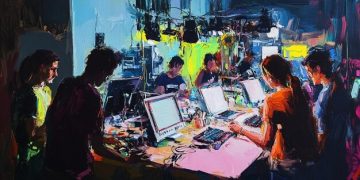The Creator Economy: A Guide to Monetizing Your Passion Online

The Creator Economy encompasses a range of independent content creators, curators, and community builders who monetize their skills, knowledge, and passions through various online platforms, fostering a direct connection with their audience.
The Creator Economy: Monetizing Your Passion and Building a Brand Online, is booming. It’s no longer just a hobby, but a legitimate career path for millions worldwide. Want to know how to leverage your skills and passions into a sustainable online income?
Understanding the Creator Economy
The creator economy is a rapidly growing sector fueled by the desire for independence and the availability of accessible online tools. It empowers individuals to monetize their unique skills and connect directly with their audiences.
But what exactly is the creator economy, and why is it so appealing?
Defining the Creator Economy
At its core, the creator economy is built upon independent creators – individuals leveraging their skills, creativity, and passion to generate income online. This includes a wide range of roles, from YouTubers and podcasters to freelance writers, designers, and course creators.
The Appeal of the Creator Economy
The creator economy offers several key attractions that draw individuals away from traditional employment:
- Autonomy: Creators have control over their content, schedule, and business decisions.
- Flexibility: Work can be done from anywhere with an internet connection, offering a better work-life balance.
- Direct Connection: Creators can build a strong relationship with their audience, fostering a sense of community.
- Income Potential: With the right strategy, creators can earn more than in traditional employment, with no income ceiling.
The creator economy is more than just a trend; it’s a fundamental shift in how people work and earn a living. It empowers individuals to take control of their careers and build businesses around their passions.

Identifying Your Niche and Audience
Success in the creator economy hinges on finding a specific niche where your passion and expertise align with audience demand. Without a clear focus and understanding of your target audience, it’s difficult to create content that resonates and attracts a loyal following.
How do you identify that sweet spot?
Finding Your Niche
Your niche should be a specific area within a broader topic. For example, instead of “fitness,” you might focus on “vegan fitness for busy moms.”
Understanding Your Audience
Once you’ve identified your niche, it’s crucial to understand your target audience. Consider their demographics, interests, and pain points.
- Who are they? Age, gender, location, income level.
- What are their interests? What else do they enjoy or care about?
- What problems do they face? How can your content help them solve those problems?
- Where do they spend their time online? What platforms do they use?
Researching your audience thoroughly will enable you to create content that meets their needs and inspires them to engage with your brand.
Building Your Online Brand
Your online brand is more than just a logo or color scheme; it’s the overall impression you create for your audience. A strong brand builds trust, recognition, and loyalty, essential for long-term success in the creator economy.
How do you build a powerful and authentic brand?
Define Your Brand Identity
Start by defining your brand values, personality, and voice. What do you stand for? What kind of tone do you want to use in your communication?
Consider these questions:
- What are your core values? What principles guide your work?
- What is your unique selling proposition (USP)? What makes you different from other creators in your niche?
- What is your brand personality? Are you playful, serious, informative, or something else?
- What is your brand voice? How do you communicate with your audience?
Consistency is Key
Maintain a consistent brand across all your online platforms, from your website and social media profiles to your email newsletters and video content.
Your visual identity should be cohesive, using the same colors, fonts, and imagery throughout. Your messaging should also be consistent, reflecting your brand values and personality.
Monetization Strategies for Creators
There are numerous ways to monetize your passion and expertise in the creator economy. Choose strategies that align with your niche, audience, and content format. Diversifying your income streams is crucial for long-term sustainability.
Let’s explore some common monetization methods:
Advertising and Sponsorships
This involves partnering with brands to promote their products or services to your audience. It can take various forms, such as sponsored posts, product reviews, and brand mentions in your content.
To attract sponsors, you need to have a sizable and engaged audience that aligns with the brand’s target market. Transparency is key; always disclose sponsored content to maintain trust with your audience.
Affiliate Marketing
Affiliate marketing involves promoting other companies’ products or services and earning a commission for each sale or lead generated through your unique affiliate link. This can be a lucrative option if you recommend products that your audience finds valuable.
Selling Digital Products
Creating and selling digital products, such as e-books, online courses, templates, and software, can be a high-margin income stream.
- E-books: Share your expertise on a specific topic.
- Online Courses: Teach a skill or offer in-depth knowledge.
- Templates: Provide time-saving tools for your audience.
Subscriptions and Memberships
Offer exclusive content, benefits, and community access to subscribers or members. This can provide a recurring income stream and foster a deeper connection with your most loyal fans.
Leveraging Social Media Platforms
Social media is an essential tool for creators. Choosing the right platforms is only half the battle; actively engaging with your audience and providing them with exclusive content goes a long way.
How do you leverage social media for growth and engagement?
Choosing the Right Platforms
Not all social media platforms are created equal. Consider your niche, audience, and content format when deciding where to focus your efforts.
Here is a rough guide to help you decide:
- TikTok: Short-form videos, trends, and challenges. Best for younger audiences and viral content.
- Instagram: Visual content, photos, and videos. Great for building a brand aesthetic.
- YouTube: Long-form videos, tutorials, and vlogs. Ideal for building a loyal subscriber base.
- Twitter: News, updates, and community discussions. Best for quick interactions and thought leadership.
- Facebook: Community building, groups, and targeted advertising. Works well for a general audience.
Engaging with Your Audience
Social media is not just about broadcasting your content; it’s about building relationships with your audience. Respond to comments, answer questions, and participate in relevant conversations.

Legal and Financial Considerations
Navigating the legal and financial aspects of the creator economy is crucial for long-term success and sustainability. Understanding these considerations will protect your business and ensure compliance with relevant laws and regulations.
What are some key legal and financial aspects to be aware of?
Business Structure
Choosing the right business structure can have significant implications for your taxes, liability, and financial management.
Common options for creators include:
- Sole Proprietorship: Simple and easy to set up, but offers no liability protection.
- Limited Liability Company (LLC): Provides liability protection and can offer tax advantages.
- S Corporation: Can offer additional tax benefits for larger businesses.
Taxes
As a creator, you are responsible for paying income taxes on your earnings. You may also need to pay self-employment taxes, which cover Social Security and Medicare.
Contracts and Agreements
When working with brands, sponsors, or other partners, always have a written contract or agreement in place. This will protect your interests and ensure that both parties are clear on the terms of the relationship.
Conclusion
The creator economy presents a unique opportunity for individuals to pursue their passions and build thriving businesses online. By identifying your niche, building a strong brand, leveraging monetization strategies, and navigating legal and financial considerations, you can turn your creativity into a sustainable income stream. Embrace the freedom and flexibility of the creator economy and embark on a rewarding journey of self-expression and entrepreneurship.
| Key Point | Brief Description |
|---|---|
| 💡 Niche Selection | Finding a specific area within a broad topic to target your content. |
| ⭐ Brand Building | Defining a consistent brand identity across all platforms. |
| 💰 Monetization | Utilizing diverse methods, like ads, subscriptions, and digital products. |
| 🌍 Social Media | Choosing the right platforms and engaging with your audience. |
FAQ
The Creator Economy encompasses independent content creators, curators, and community builders who monetize their skills and passions directly through online platforms.
Begin by reflecting on your passions and skills, then research to find where your interests intersect with audience demand. Look for underserved areas to make an impact.
Popular monetization methods include advertising, sponsorships, affiliate marketing, selling digital products, and offering subscriptions or memberships for exclusive content.
The best platform depends on your niche and audience. TikTok is great for short videos, Instagram for visuals, YouTube for long-form content, and Twitter for quick updates.
Creators should consider their business structure, tax obligations, and the importance of having clear contracts when collaborating to protect their financial and legal interests.
Conclusion
The creator economy offers unparalleled opportunities for individuals to monetize their skills and passions online. By understanding the key aspects discussed in this article, creators can build a sustainable business and thrive in this dynamic landscape.





